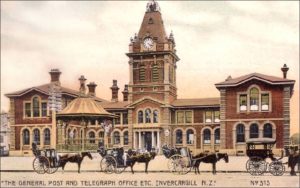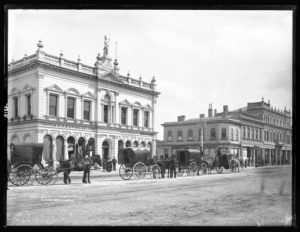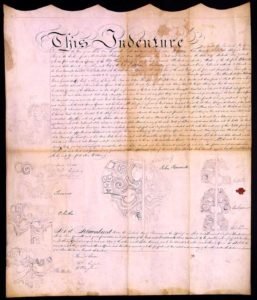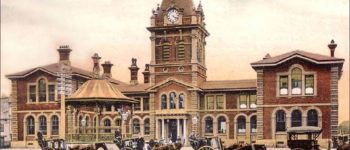1856: Invercargill
January 17, 2020
By AHNZ
 Today in history, 17 January, 1856, the Southland city of Invercargill got its name. The proposal came from Governor Browne as a concatenation of ‘inver’ (for river mouth; Gaelic) and ‘Cargill’ for Otago’s leader, Captain William Cargill.
Today in history, 17 January, 1856, the Southland city of Invercargill got its name. The proposal came from Governor Browne as a concatenation of ‘inver’ (for river mouth; Gaelic) and ‘Cargill’ for Otago’s leader, Captain William Cargill.
Visiting Dunedin, the new Governor of New Zealand Colony was given a morning banquet where the idea was socially hatched to give Southland a new port of entry. The location was to be The Bluff but instead of taking on the name Invercargill it is still called that, or, more often these days, just Bluff. The name would go to the settlement already taking shape further north.
“A public Dejeuner, in honor of the visit of His Excellency the Governor, was given at the Royal Hotel, Dunedin, on the 17th ‘ instant. Between 50 and/ 60 of the settlers of Otago were present…”- Public Dejeuner, Otago Witness; Papers Past
“Bluff, where a new town now waits for the baptism, I hope to give it before we part this evening.. The child of some one of those who now hear me may perhaps say to his grand-child, “we have heard with our ears and our fathers have told us” that in the old time there came a Governor to Dunedin, who foretold this and this; our fathers thought him “a dreamer of dreams,” but, look around and you may see more than he ever dreamed of in his philosophy.”- Gov. Brown’s toast; ibid
 The dreaming Governor’s foretold metropolis certainly did come to pass, though no Anarchist would offer him the credit. By time of these children’s grand-children he mentions, about 1900, Invercargill had indeed grown in wealth and majesty. The General Post and Telegraph Office photographed above showed it, and so did the Invercargill Athenaeum (the remains of which have so recently been black-bagged.)
The dreaming Governor’s foretold metropolis certainly did come to pass, though no Anarchist would offer him the credit. By time of these children’s grand-children he mentions, about 1900, Invercargill had indeed grown in wealth and majesty. The General Post and Telegraph Office photographed above showed it, and so did the Invercargill Athenaeum (the remains of which have so recently been black-bagged.)
Anarchist Time: Invercargill Really A Statist Program!
So much for the Statist history origin story about Invercargill and the Governor’s philosophical founding dreams! Now let’s pour a little Anarchist thinking on the situation, shall we?
Until Brown came to sanctify the Dunedin Mafia, the settlers of ‘Southland’ were able to import dutiable goods without paying an extortion money to said Mafia. They had been doing so since the 1830s quite independently, like a bunch of anarchists or something.
Governor Gore Browne popped down to curb these liberties that were cheating poor Otago province out of ‘lawful revenue’ in 1856. He announced the nationalising of the port down there and the assigning of some bureaucratic agents, suggesting the new State port should be called “Invercargill.”
As usual, free people were already well underway and making a success of life. And, again, as usual, flourishing humans attract the parasitism of Government wanting to take a piece of the action.
“In January, 1856, when Colonel Thomas Gore Brown, who was then Governor of New Zealand was visiting Dunedin a deputation waited on him and explained the need for establishing a port of entry in the southern part of the province of Otago. Bluff was the natural selection. One reason for the request was that the settlers in the south- and by this time they were beginning to increase noticably- were able, as things were, to import dutiable goods from overseas without payment of any dues thus depriving hte province of Otago of lawful revenue.”- Ref. History of Northern Southland; Hamilton (1952)
 The Spencer Deed (image left) is just one example of how free people had gotten to Southland first. This one comes from 1839 between Ngai Tahu Chief Bloody Jack/John Towack King of the Bluff and resident trader James Spencer.
The Spencer Deed (image left) is just one example of how free people had gotten to Southland first. This one comes from 1839 between Ngai Tahu Chief Bloody Jack/John Towack King of the Bluff and resident trader James Spencer.
My guess is it was taken to New South Wales to be ratified legally but revoked later. Captain Howell had a similar deal in his settlement, the town we know today as Riverton. Likewise, Captain Johnny Jones had huge tracts of land he had purchased from Maoris as outlined in The Wentworth indenture (1840.) When The Hobson Gang took power they meanly wiped the slate clean on a great many deals done throughout New Zealand. Why? Only because Statist paracites needed to ensure they were in control and were getting their cut.
“
Invercargill’s first settler was Irishman John Kelly, a seaman who was living on Ruapuke Island. In March 1856, he moored his boat in the Ōtepuni Creek, put up the settlement’s first building for his wife and children, and ferried settlers up the estuary and into the hinterland. For a while, the new settlement was named Inverkelly after him.”- Te Ara
In this case, Invercargill was really a Crown Colony take-over of Captain James Kelly’s 1853 settlement, Inverkelly. It doesn’t matter if it’s Port Nicholson or Jerusalem or Inverkelly. The State cannot abide self-governing communities.
—
Image ref. Postcard showing ‘The General Post and Telegraph Office Etc. Invercargill, NZ’ circa 1908; NZH&NH; Facebook
Ref. Kelly Of Inverkelly: The Story Of Settlement In Southland 1824 – 1860 (1944)
3 thoughts on "1856: Invercargill"
Leave a Reply
 Like Comment Share
Like Comment Share






Very arresting and wducational
Very arresting and educational. My first email had my email incorrectly spelt out I think or maybe not! The first j should be in lower case – ie
jennywren1@xtra.co.nz
Thanks Jenny